

Booktrust. Howard Jacobson attacks the dearth of 'good readers' The novel is in danger, according to Howard Jacobson, the Man Booker prize-winning author of The Finkler Question.
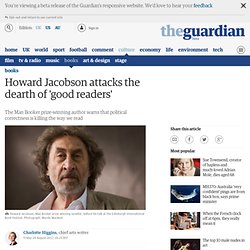
But, he said, the fault lies not with novelists, but with the lack of good readers. Describing his experience of appearing at reading groups – "sometimes they are lovely, sometimes they aren't, and sometimes they are just staggeringly rude" – Jacobson said that he felt a sense of "heartbreak" when he heard readers say, "I don't like this book because I don't sympathise with the main character. " He added: "The language of sympathy and identity and what we call political correctness is killing the way we read. "That's like the end of civilisation. That is the end. Speaking at the Edinburgh International Book Festival, Jacobson said that the reader needed a "strong stomach" and ought to be able to withstand the "expression of an ugly point of view" in a book.
His latest book, Zoo Time, is a comic novel about what he called the "multiplying degradations" of being a writer. Little Free Library can help put a library on your corner. I happened upon this mini-library in my neighborhood and am so impressed with the movement that Little Free Library has started that I am getting one together for our street.
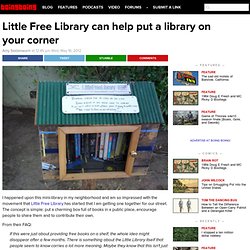
The concept is simple: put a charming box full of books in a public place, encourage people to share them and to contribute their own. From their FAQ: If this were just about providing free books on a shelf, the whole idea might disappear after a few months. There is something about the Little Library itself that people seem to know carries a lot more meaning. Maybe they know that this isn't just a matter of advertising or distributing products. Little Free Library sells pre-made mini-libraries or will show you how to build your own.
Check out a couple of my favorites from around the country:
Bookshops and Book Retail. The 10 best first lines in fiction. Teach the Books, Touch the Heart. We’d just finished John Steinbeck’s “Of Mice and Men.”
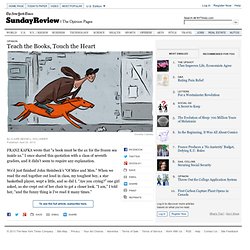
When we read the end together out loud in class, my toughest boy, a star basketball player, wept a little, and so did I. “Are you crying?” One girl asked, as she crept out of her chair to get a closer look. “I am,” I told her, “and the funny thing is I’ve read it many times.” But they understood. For the last seven years, I have worked as a reading enrichment teacher, reading classic works of literature with small groups of students from grades six to eight. Along with “Of Mice and Men,” my groups read: “Sounder,” “The Red Pony,” “A Raisin in the Sun,” “Lord of the Flies,” “The Catcher in the Rye,” “Romeo and Juliet” and “Macbeth.” And yet I do not know how to measure those results.
Until recently, given the students’ enthusiasm for the reading groups, I was able to play down that data. Since beginning this new program in September, I have answered over 600 multiple-choice questions. A Slow-Books Manifesto - Maura Kelly - Entertainment. Read books.
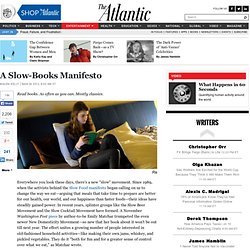
As often as you can. Mostly classics. Reuters Everywhere you look these days, there's a new "slow" movement. Since 1989, when the activists behind the Slow Food manifesto began calling on us to change the way we eat—arguing that meals that take time to prepare are better for our health, our world, and our happiness than faster foods—their ideas have steadily gained power. I'm all for efforts like these. That's why I'm calling for a Slow Books Movement (one that's a little more developed than this perfectly admirable attempt). In our leisure moments, whenever we have down time, we should turn to literature—to works that took some time to write and will take some time to read, but will also stay with us longer than anything else. To borrow a cadence from Michael Pollan: Read books. Aim for 30 minutes a day. But Slow Books will have standards about what kinds of reading materials count towards your daily quota.
Also excluded: non-literary books. Why the emphasis on literature? Why Finish Books? by Tim Parks. “Sir—” remarked Samuel Johnson with droll incredulity to someone too eager to know whether he had finished a certain book—“Sir, do you read books through?”
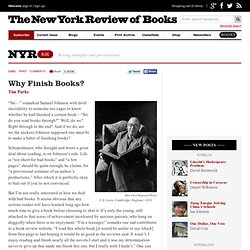
Well, do we? Right through to the end? And if we do, are we the suckers Johnson supposed one must be to make a habit of finishing books? Schopenhauer, who thought and wrote a great deal about reading, is on Johnson’s side. Life is “too short for bad books” and “a few pages” should be quite enough, he claims, for “a provisional estimate of an author’s productions.” Reading With Strangers: Ways to Study Literature Collaboratively.
Catalog your books online. Future of Reading. Reading Lists.